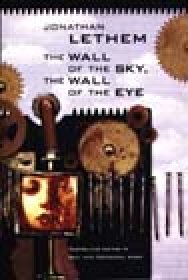Jonathan Lethem, The Wall of the Sky, the Wall of the Eye
reviewed by Jörn Grote

|
|
The Wall of the Sky, the Wall of the Eye Author: Jonathan Lethem Publisher: Tor Books Date: July 1997 Paperback: 304 pp. ISBN: 0312863535 Price: $5.98 up |
There is the golden rule told to many aspiring writers: Show, don’t tell. As with much things, I’m more for balance, and because of that I think showing and telling should be equal. If you tell too much, you have something like hard SF with its heavy info-dumps. On the other hand, if you use showing too much, you get atmospheric pieces that very often doesn’t make much sense. Case in point: Jonathan Lethem. While I like his novels, the weaknesses of his writing shows (what a play of words) much more in his short stories.
Of the seven stories collected in The Wall of the Sky, the Wall of the Eye, only one was really good. In “The Happy Man,” the main character occasionally makes premature visits to hell. But hell is personal to everyone, and trying to make sense of what he has seen there when he comes back to our world is what drives this story.
Also, his son is helping him, mapping his father’s hell as if it were a computer game, something that makes his father very uncomfortable. But hell is not the only problem, because while he is absent, his body lives still on like a zombie, and his family has to deal with it.
The gist of the story is, that the main character had an traumatic experience in his childhood, where his uncle has abused him sexually. When he gets to hell he is a child again in a fairy tale land with recurring characters like the witch; and the whole time there is a little like a computer game narrative where every visit repeats the same pattern of his former visits. Whenever he tries to go a new path or explore a new room, somehow that experience changes. But in the end the outcome is always the same: he gets abused again by the same character.
The father feels uncomfortable, because his son maps the paths he is following in this fairy tale land that is his own hell, and while he doesn’t tell him everything about what happens there, seeing his son looking at the replica of his hell makes him feel guilty. He fears that somehow he will drag his son into his hell.
The other stories in the collection cover the whole range from “that was an interesting background, but the main characters and the plot were merely okay” to moments of “that seems to be written by someone trying too hard to be weird.”
“Five F****“ (obscenity deleted) is weird in an good way. It has an internal logic and consistency that seems plausible in the context of the story; but more importantly there is a substantial plot there.
“Access Fantasy” was weird but not very good, probably the worst of all stories in this collection. “Access Fantasy” looks like it is written solely to achieve a stylistic weirdness; there is not enough explained to understand why things happens. It seems that Lethem likes to write about things that are strange without trying to give them context in any way. It’s like traveling through another country, seeing strange traditions, but nobody can explain what they mean or how they came to be. They are just there to be strange.
That’s one of the big problem I have with many of his stories in the collection. Maybe Lethem wants to weird out his readers, but for me that is a big downside in a story, because I want to understand things. True weirdness comes from differences between what we see as normal and what is outside of our experience, not from unexplainable things. John Shirley, for example, is a master in creating really weird settings, but is always able to make them believable in the context of his stories.
Another problem I had with “Access Fantasy” was the conclusion, which was a big letdown. It felt not as if the problem of the story was tackled, more as if the story just stopped. I admit that it could be that I just don’t get the ending, but nonetheless I was not very happy with it.
“How We Got in Town and Out Again” and “The Hardened Criminals” were okay; there were some interesting ideas in there, like criminals with life-sentences transformed into bricks to build the walls of a prison, but the stories were nothing extraordinary. They differ from “Access Fantasy” in that they have a plot with a begin, a middle part, and an ending that concludes the story. The tension in the stories arrives logically from the characters and the setting. I don’t think the stories in themselves were extraordinary, but they worked as stories, whereas “Access Fantasy” failed even that in my eyes. The plot had no real conclusion and the setting itself didn’t made much sense in the first place.
The two stories “Light and the Sufferer” and “Sleepy People” were of the kind where you understand all that happens, yet you ask yourself What the hell did the author want to tell the reader? or Why did he write these stories in the first place?
These stories had a plot that worked, unlike “Access Fantasy,” which doesn’t; but they had the same problem with the setting. Strange things happen, but the author doesn’t even try to explain why. In “Light and the Sufferer,” the main characters tries to help his brother to get away from his addiction and his criminal life. That part of the narrative is okay. What doesn’t make much sense is that the whole time they are followed by an catlike alien. That’s it. The main character had heard why these aliens sometimes follow people, but in the end all these theories are proved wrong. There is no rational reason. It just follows them. Maybe I just don’t get his stories. I’m really not sure about that.
“Sleepy People” is even stranger. A women finds a sleeping man in front of her door, takes him into her home. The guy sleeps the whole time. The plot that somehow makes sense is that she feels lonely, and tries to use that sleepy guy to feel as if she wasn’t alone anymore. Then it gets weirder. The sleepy guy had friends, who fight against another undefined group. The woman gets attacked later from that second group, then the first group comes and takes the sleepy guy with them. End of story.
Lethem’s novels work mostly because he has the space to develop his characters and the background; and while he doesn’t like to tell the reader much, one can deduce what is needed or just enjoy the strange worlds he creates. But that doesn’t work as well in his stories. The collection is for people who either are big fans of Lethem, or like nonsensical stories where they can interpret what happened without ever finding a definitive answer.
I have a good quote from a webpage I recently read, On the nature of Surface and Depth: or why most College Freshmen write terrible plays.)
“If you want to say something profound with your work, I salute you. I really do. But if you’re going to do it using narrative and metaphor, your first, most important job is to make it exciting and real for the reader — to make it work as narrative first. Fail that, and you have a colossal waste of everyone’s time, most particularly your own.“
I think Lethem did exactly that with most of the stories. He wasted my time.
Copyright © 2005 by Jörn Grote

